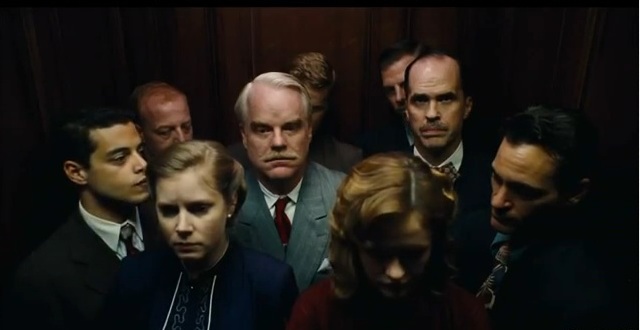Review: Paul Thomas Anderson's The Master
By Rob Christopher in Arts & Entertainment on Aug 22, 2012 3:20PM

First: everything you've heard about The Master is true; and, in best Paul Thomas Anderson fashion, not true. If so-called spoilers upset you, then stop reading right now. (Although spoilers are about the last thing on Anderson's mind.) Many elements in The Master seem familiar at first, but Anderson makes them feel alien through context. As the last image cuts to black, you may find yourself saying, "Boy, I've got to see this movie again." We certainly did.
The time is the early 1950's. Joaquin Phoenix plays Freddie Quell, a WWII veteran with a talent for chemistry and photography as well as a disabling weakness for alcohol. He drifts from job to job, staying in one place only long enough to royally screw things up. Until one day—by chance? or not?—he falls into the orbit of Lancaster Dodd, played by Philip Seymour Hoffman. Dodd is an intellectual of all trades: a doctor with several degrees who also claims to be both a philosopher and a nuclear physicist. The sort of writer who puts three different acronyms after his last name on the title pages of his books.
Also: a kind of messiah. The Master. The Cause is a vaguely scientific-appearing mélange of pop psychology and faith centered on the use of sessions called "applications" to time travel back to one's past lives in order to discover blockages in the present. The charismatic, hyper-articulate way that Dodd presents himself and his ideas has built up a small but fervent cadre of followers.
In other words, a cult.
The Cause isn't Scientology. It may be a cult similar to Scientology, but a cult is a cult is a cult. Several moments in the movie echo Jonestown: The Life and Death of People's Temple, the great documentary by Stanley Nelson. With great insight Anderson shows how leaders like Dodd maintain power over their followers by keeping them in a state of perfect imbalance, taking away any initiative for self-direction by subtly but continually changing course. In one memorable scene, one of Dodd's wealthy adherents (a wonderful Laura Dern) asks the Master to clarify a change of wording he's made in a key application, one that imparts a wholly different meaning to the procedure. Dodd loses his temper; it's clear that the tiniest appearance of doubt or questioning verges on apostasy.
"Don't you see that he's just making it up as he goes along?" one of Dodd's sons asks Quell. Directionless and wracked by inner pain, Quell falls easily under Dodd's influence. He lacks a father and Dodd is only too happy to play that role. Like There Will Be Blood, Hard Eight, and Boogie Nights, The Master is another exploration of Anderson's themes of adopted fathers and ad hoc family structures. It's less concerned with hitting plot points or tidying up its characters' messy lives. In fact, the movie's "happy" ending is actually disorienting; just as Dodd keeps his followers off balance, Anderson remains firmly ambivalent to the end. Is Dodd a self-aware charlatan or genuine visionary? Is the Cause actually dangerous, or just silly?
Anderson doesn't answer these questions. Much of the Cause's philosophy seems like common sense, and is even helpful to its adherents. It doesn't appear to be a Jonestown-like death cult, but it's also true that Dodd's followers have no individual lives outside of the Cause, and the "epiphanies" generated by the movement are all dead ends that lead only to further submission to Dodd.
Hoffman's performance is so arresting that he could easily walk away with the movie, but he's matched by the rest of the cast. Phoenix is a combustible mix of Brando-style mumbling and volcanic violence. He actually feels dangerous. While Amy Adams, as Dodd's tenacious and manipulative wife, is chillingly perfect. You get the sense that without her ruthless encouragement, Dodd might simply smother himself with his own words.
Quite simply, The Master is the most startlingly evocative movie we've seen since Far From Heaven. Romanian cinematographer Mihai Malaimare Jr., best known for his recent work with Francis Ford Coppola, captures the look and feel of the early 50's in a way that makes every shot feel freshly washed. And if Jonny Greenwood's score isn't quite as creepy as the one he did for There Will Be Blood, his percussion-heavy soundbed for this movie is just as hypnotic.
Like Anderson's other great works, The Master is a movie that begs for repeat viewings. It's scheduled to open in Chicago on Sept. 21; we'll be ready to see it again. The Music Box is attempting a return 70mm engagement in early 2013, so keep your fingers crossed.